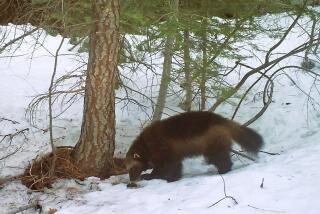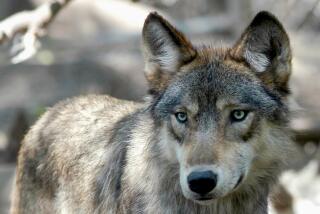Keep wolverines protected, scientists urge Interior Department
Dozens of the nation’s leading conservation scientists on Thursday expressed strong concern over a U.S. Fish and Wildlife Service official’s order to override a recommendation by federal biologists that wolverines deserve threatened species status.
In letters to the agency and the Interior Department, the scientists urged the agency to uphold the recommendation that protection for the 300 wolverines in the continental United States is warranted because climate change is shrinking remaining alpine habitat and spring snowpack for building sheltered dens to raise their kits.
USFWS Director Dan Ashe is expected to make a final determination on the matter Monday.
A letter sent on behalf of the Society for Conservation Biology and the American Society of Mammology said that the order to quash the recommendation “demonstrates a serious flaw in the FWS’ listing determination process.”
Shaye Wolf, climate science director of the Center for Biological Diversity and one of 56 scientists who co-signed a separate letter, was more blunt.
“The underlying problem here,” Wolf said in an interview, “is an administrator’s willingness to allow politics to trump science in politically charged decisions.”
Noreen Walsh, a biologist and Fish and Wildlife director for the region that includes Wyoming and Montana, initially supported the recommendation after it was issued in early 2013.
Officials in three states where most of the snow-loving animals are still found -- Wyoming, Montana and Idaho -- vigorously argued that conclusions about the effects climate change will have on wolverine behavior and habitat are premature.
The states also questioned the degree to which the animals rely on spring snowpack, and warned that federal protection could adversely effect recreational activities, development and trapping in alpine terrain already locally managed for wolverines in their states.
In response, a panel of nine biologists reevaluated the scientific information. They concluded in April that wolverine populations, by the end of the century, would probably be significantly affected by habitat loss due to climate change.
In May, Walsh ordered a reversal of the recommendation to list the animals as threatened, citing uncertainties “about the degree to which we can reliably predict impacts to wolverine populations from climate change,” according to agency documents obtained by The Times.
The letter signed by 56 scientists including Wolfe and Stuart Pimm, Doris Duke Professor of Conservation at Duke University, warned that using “uncertainty” as an excuse to dismiss the best available science sets a “dangerous precedent given that so many rare and imperiled species are very difficult to study and assess.”
A listing as threatened under the Endangered Species Act would protect U.S. wolverines as a population segment geographically separated from those in Canada and Alaska. There are scattered populations of wolverines, the largest member of the weasel family, beyond Wyoming, Montana and Idaho. A lone wolverine was spotted in California in recent years.
Follow me @LouisSahagun for more fascinating stories







